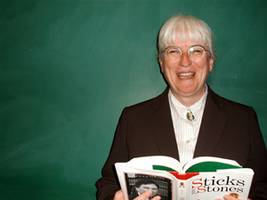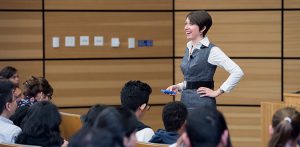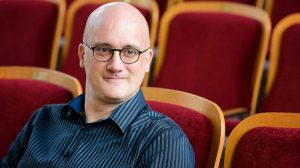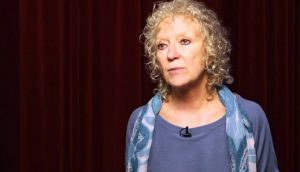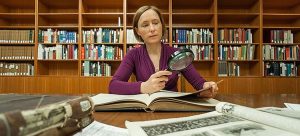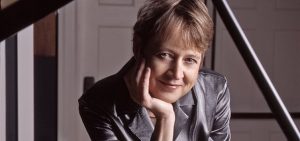Judy Brown honoured with Canada’s top teaching award
By Mary Leong A passion for teaching and a commitment to her students earned Professor Judy Brown, who teaches in the Dept. of English, Canada’s top teaching award. Teaching always felt like the right thing to do, says Brown, recently recognized with a 3M National Teaching Fellowship Brown, who started at UBC as a teaching […]
Meet Professor Catherine Rawn: Training your brain
By UBC Public Affairs Teaching the fundamentals of academic success Procrastination. Anxiety. Distractions. Bad habits. They are the four horsemen of academic apocalypse, and Jeremy Butt learned about them all too well in his freshman year. Grades-wise, the UBC Arts student survived his first year at university with mostly B’s and C’s. But he knew […]
Dr. Becki Ross receives Clio award for uncovering Vancouver with Burlesque West
By Katie Fedosenko WAGS/SOCI prof wins Clio award for researching the striptease entertainment industry and contributing to Vancouver history Stanley Park, Gassy Jack, logging, Expo 86-these are some typical topics in the history of Vancouver. The study of exotic dancing, although very economically and socially prominent in the west coast city during the twentieth century, […]
Meet Professor C.W. Marshall: Directing The Misanthrope
By Loren Plottel UBC CNRS Prof C.W. Marshall directed the world premiere of The Misanthrope, playing at the Jericho Arts Centre June 4-27, 2010. The play was written by Tony Harrison, an award-winning English poet and playwright, who was a Green College Visiting Scholar in 2009. Best known for his controversial works like the poem ‘V’ […]
GRSJ Professor Veronica Strong-Boag wins prestigious SSHRC Award and Fellowship
By Loren Plottel UBC Professor Veronica (Nikki) Strong-Boag has been awarded the Jules and Gabrielle Leger Research Fellowship from SSHRC for her study of an exceptional Canadian “power couple.” “An Edifying Couple: Lord and Lady Aberdeen, Liberal Aristocrats, Reformers, and Viceregal Activists in an Imperial World (1877-1939)” is the title of the project that won […]
Meet Dr. Mauricio Drelichman: Helping Economics students use research positions to get ahead
Economics professor Mauricio Drelichman believes undergraduates make excellent research assistants.
“I have had much better results in many cases with undergraduates,” Drelichman said, “Graduate students do not need to be research assistants to go to bigger and better places; undergraduate students are really hungry for these opportunities.”
Drelichman believes undergraduates are not given enough consideration for research assistant positions. “A lot of [positions] just require clear thinking and attention to detail,” he said, explaining these are skills most undergraduate students already possess.
“It’s amazing with undergraduates because they really get involved. They do a great job because the motivation is stronger.”
Anthony Wray, Honours History and Economics, and Yamila Simonovsky, Honours Economics, had the chance to work with Drelichman on a number of his research projects before they graduated this May.
“The first task that he’s given me is to go through secondary sources on his research related to Philip II in Spain and record any references to military expenditures,” Wray said, explaining he was also required to calculate exchange rates of the many currencies and coinage he was dealing with.
The project Wray is working on has to do with researching the beginnings of sovereign debt. Drelichman believes it to have begun during Philip II’s reign, and is using Wray’s record of military expenses in collaboration with Philip II’s demands for funding to explain its origin.
Wray started working with Drelichman in March and will continue until August. Drelichman is using the funds he received from the Arts Undergraduate Research Award (AURA) to finance Wray’s position. He believes the AURA should be used exclusively to employ students in research positions.
“I have my own grants for my work,” Drelichman said, “This way I can give students the opportunity to participate in research.”
“The AURA award has a huge impact as it […] makes faculty think of undergraduates.”
Simonovsky has worked on several projects with Drelichman. Her most recent task involved comparing a list of modern Spanish cities with a 16th century census. Simonovsky matched cities from the census to modern cities and recorded the population, a task that sometimes required her to use Google maps.
The research Simonovsky conducted helped Drelichman study the impact of Spanish nobility on economic activity. Using her updated lists of Spanish cities, he measured changes as related to the proportion of nobles.
Drelichman aims to make his research positions as meaningful as possible for the students involved, and play to their strengths.
“I involve them in key parts of the research,” he said, “I don’t assign menial tasks like photocopying.”
Simonovsky and Wray were given their opportunities after previously approaching Drelichman in hopes of being employed in research. Although he had no positions available at the time, Drelichman kept the students in the back of his mind. When positions freed up, he immediately thought of Simonovsky and Wray.
“It’s very important that students approach professors if they want to work with projects.” Drelichman asserted.
He also mentioned that these students were given opportunities to work with faculty members at other universities that needed research done in Vancouver. Simonovsky was involved in a project managed by a colleague of Drelichman’s that compared the prices of Safeway in the United States to those in Canada.
Simonovsky and Wray’s research experience came in handy when they were writing their theses, and helped prepare them for their upcoming endeavours in graduate school.
“Both of us are going to grad school in economics,” Wray said, “From that point of view it looks good; but more than that, […] you get that experience working on an intense research project.”
Drelichman was adamant that the best preparation for graduate school comes from experience in research.
“Grad officers have a difficult task identifying people that would produce good research,” Drelichman said from his personal experience as a graduate admissions officer.
Drelichman explained that excellent marks in undergraduate courses do not necessarily indicate that a student is ready for graduate studies: “[Graduate school] is about who can independently formulate and carry out a research project.”
“When you get an admission letter that says this person has research experience, it’s a sure win for admission,” he said.
“Experience speaks more than any transcript or standardized test.”
By Meghan Roberts (BA 2008, English Literature and International Relations).
Meet Dr. Duanduan Li: Teaching the Chinese language
When Professor Duanduan Li joined UBC from New York City’s Columbia University in 2003, she did so for a specific reason. She had worked as director of Columbia’s Chinese language program and was attracted to UBC because of its large community of heritage language (HL) learners — students with a background, though not necessarily a fluency, in the language being taught.
Meet Professor Mary Chapman: Pioneering American suffrage literature research
Associate Professor Mary Chapman won the 2006 Yasuo Sakakibara Prize from the American Studies Association for an essay on writer Sui Sin Far, believed to be the first Eurasian to publish in Canada and the United States.
The paper is part of a book-in-progress on American suffrage literature, and examines Far’s work during the Progressive Era, a period of reform from the 1890s through the 1920s that saw many Americans push for social justice, general equality, and public safety.
Separated from her two-year-old son for nearly a year, a Chinese mother sacrifices everything to get him back. After spending her life’s savings to hire a lawyer, the woman is reunited with her child. But he no longer remembers her, or their native tongue.
She can’t believe that the government would take away her child in what she thought would be “the land of the free.”
The story — entitled “In the Land of the Free” — was published in 1912 in Mrs. Spring Fragrance, a popular short story collection by Sui Sin Far, pen name of British-born writer Edith Maude Eaton (1865 – 1914).
The story collection reflects the struggles and joys in the daily lives of Chinese families in North America. Far, who lived in Montreal and later moved to San Francisco and Seattle, depicts the anguish of Chinese immigrants, and the suffering inflicted by discriminatory immigration laws.
Associate Professor Mary Chapman, who teaches in the Department of English, recently won the 2006 Yasuo Sakakibara Prize from the American Studies Association for an essay she wrote on the pioneering writer.
Chartered in 1951, the American Studies Association has more than 5,000 members, including teachers and other professionals, concerned with American culture.
Prof. Chapman’s paper is part of a book-in-progress on American suffrage literature, and examines Far’s work during the Progressive Era, a period of reform from the 1890s through the 1920s that saw many Americans push for social justice, general equality, and public safety.
Among other things, the progressive movement called for the humane treatment of mentally ill people, worked for the organization of unions, and gave citizen women in the United States the right to vote by 1920.
Prof. Chapman probes into Far’s awareness of the shortcomings of the Progressive Era and the exclusion of Chinese immigrants from fundamental rights.
“At the very same time that they were advocating greater access to government, and votes for women, they excluded the Chinese from immigrating,” Prof. Chapman says.
Born to a Chinese mother and a British father, Far began her career at The Montreal Star and wrote one of the first public statements in opposition to the Chinese Head Tax in Canada. She wrote numerous articles and stories, which appeared mainly in American newspapers and magazines.
Prof. Chapman has found new material through what she calls intense digging in Far’s life. After searching for works not included in “Mrs. Spring Fragrance,” she has found articles showcasing the writer’s interest in China’s efforts to change outdated laws.
The enfranchisement of women in a Chinese province in 1912, while progressives in the U.S. were still campaigning for women’s right to vote, exposed the limits of American efforts to reform, says Prof. Chapman.
“So all of a sudden, this culture, which even the most progressive-minded Americans had perceived as inferior and backward, had given their votes to women,” she says.
“Far was very supportive of the Chinese reform movement which had, as one of its goals, the enfranchisement of Chinese women,” she adds. “She took great delight in showing how liberated Chinese women were.”
Prof. Chapman believes it was clear to Far that the progressive movement had an exclusive agenda. The writer’s “In the Land of the Free” pinpoints just that.
The story simultaneously captures the humanity of Chinese people while demonstrating the human costs of racist laws. A young boy’s inability to recognize his mother and the loss of his native language at the story’s end signals the costs of cultural assimilation.
“There were so many racist policies that coincided with the progressive movement. So I think Sui Sin Far was a very canny judge of that,” Prof. Chapman says.
As the first Eurasian to publish in Canada and the United States, Far’s writing in prominent magazines such as Good Housekeeping and New England Magazine gave Americans of Chinese ancestry and women a literary voice, notes Prof. Chapman.
“What I’m finding really interesting about her is that she is broadly concerned with questions of mixed race, hybrid cultures, and other races in the broader continental context,” she says.
“Her focus, and her topics go way beyond her interest in the Asian American community, which is what she is well known for.”
The story of a white stenographer in Seattle who, on her wedding day, discovers that her husband has fathered an Alaskan child sheds light on Far’s curiosity, suggests Prof. Chapman.
“Her interest in hybridity goes far beyond the Asian American experience,” she adds.
Prof. Chapman’s current project on American suffrage literature and interest in how women find voices in historical contexts that do not allow them to speak has brought to light the writer’s unique position.
“I was finding that so many of my chapters were focused on white women from the northeast,” she adds, “so I was so happy to find Sui Sin Far’s stories, which offered a very different perspective.”
Prof. Chapman hopes to publish a second collection of Far’s writings to move the writer away from a position that is strictly pro-Chinese, or anti-Progressive.
“There are big gaps in her publication history and I think that most people have just focused on this book that appeared, but the fact is she was an active journalist for at least 15 years,” Prof. Chapman says.
By Michelle Keong, an English and Classical Studies major. She is in the Arts co-op program.
Meet Professor Dawn Currie – An interest in Social Justice
An interest in social justice drives Professor Dawn Currie’s work.
As an academic, it’s taken her to Vietnam, where for the past decade she’s been involved with a project to advance gender equity.
As a feminist scholar, that same interest sparked her latest study, which examines the processes shaping young girls’ sense of who they are.
Currie, who teaches in the Dept. of Sociology, specializes in teaching aspiring sociologists their core research methods as well as the essentials of feminist theory.
“I make the starting assumption that students in sociology are curious about the social world,” she says.
Her own curiosity has — in turn — been fueled by interactions with her students. She says her day-to-day contact with young women exposed her to the issues they face and developed her interest in studying girlhood.
Currie’s most recent book, Girl Talk: Adolescent Magazines and Their Readers (University of Toronto Press: 1999), explores how girls interpret the messages in women’s magazines.
Her current study examines the avenues through which adolescent girls are able to forge new, non-conventional girlhoods. Currie, along with colleague Deirdre Kelly (UBC Faculty of Education) and Shauna Polmerantz (UBC PhD Educational Studies ‘06) are in the final stages of a book on the topic.
This project looks at girls who throw the competition for popularity out the window and reject the notion of trying to dress a certain way and win approval from boys.
Currie and her co-researchers are interested in girls who take up non-conventional activities such as skateboarding, and even studies the games girls play online, looking at the personas they take on in virtual worlds where they can escape the expectations of their everyday peer culture.
On a global level, along with her colleague Huguette Dagenais (Laval University), Currie is mentoring researchers in Vietnam. One study explored what happens when young people, especially girls, migrate from the countryside into the city to find work.
“The group would identify a development issue that they want to work on and then we would tutor them through the different stages of designing a research project,” says Currie, explaining her mentorship role.
She began teaching at UBC in 1988, after earning her PhD at the London School of Economics and working briefly at two other universities.
“Knowledge, especially of something social like gender relations, has to be very specific to the time, the place, and the culture,” she adds.
For this reason, the goal was to assist the Vietnamese investigators through the process of creating their own research, rather than importing the knowledge of gender of others. The same impetus lies behind teaching students in the classroom to conduct research and theorize for themselves, she explains. “Research is the best way to make knowledge relevant,” Currie says.
“The most rewarding thing about teaching, regardless of a student’s final grade, is seeing a student who has real curiosity work through the process of figuring out how to do good inquiry.”
Meet Professor Emerita Jane Coop: Playing the piano
One of Canada’s most celebrated pianists, Coop is head of the keyboard division at the School of Music, where her work earned her the laurels of Distinguished University Scholar in 2003 and, more recently, the 2007 Killam Teaching Prize, which recognizes UBC’s best teachers.
